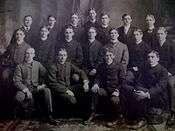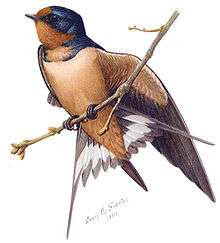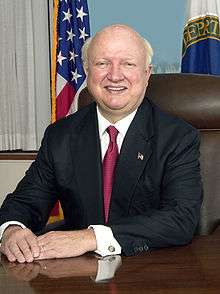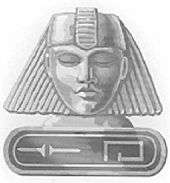Sphinx Head
The Sphinx Head Society is the oldest senior honor society at Cornell University. Sphinx Head recognizes Cornell senior men and women who have demonstrated respectable strength of character on top of a dedication to leadership and service at Cornell University.[3] In 1929 The New York Times held that election into Sphinx Head and similar societies constituted "the highest non-scholastic honor within reach of undergraduates."[4]
Founding
Sphinx Head was founded on October 11, 1890 by a group of ten men from the senior class.[5][6] The Society was founded in order to "create and maintain a stronger feeling" for Cornell University and to promote "a closer and stronger friendship among members of the Senior class."[5] The New York Times referred to Sphinx Head as "a secret senior society of the nature of Skull and Bones", a senior honor society at Yale University of which Andrew Dickson White, Cornell University's co-founder and first president, was a member.[7] White encouraged the formation of a secret society system on the Cornell campus.[8]
In 1926, the society built a clubhouse for itself designed to resemble an Egyptian tomb perched halfway down the cliff on the Fall Creek gorge. It sold the building in 1969, and it eventually became the home and office of astronomer Carl Sagan.
Membership

Each year, Sphinx Head taps fewer than forty men and women of the senior class for membership. Since the Society's founding, membership has been "reserved for the most respected" members of the senior class.[9] The names of newly tapped Sphinx Heads were published in The New York Times through the 1930s, but are now published exclusively in The Cornell Daily Sun.[10][11][12]
Sphinx Head awards honorary membership to Cornell administrators, faculty, staff, and alumni for their "significant personal and/or professional accomplishment, outstanding leadership, distinguished service to the university and interest in and commitment to undergraduate student life and development."[3] Notable honorary members of Sphinx Head include Tata Sons Chairman Emeritus Ratan Tata, Atlantic Philanthropies founder Chuck Feeney, and the 12th President of Cornell University, David Skorton.
At Cornell
Sphinx Head has "retained an aura of mystery throughout its history on campus", holding some "closely guarded secrets and traditions."[13]
Although membership in Sphinx Head is public, the proceedings of the Society remain concealed. Since founding the Society, Sphinx Head members have been responsible for starting many long-standing Cornell University traditions such as the annual Dragon Day celebration, the use of "The Big Red" to describe Cornell athletics, as well as Spring Fest, the precursor to the current Slope Day celebration.[9][14][15]
Members of Sphinx Head have held many prominent positions within Cornell University serving as presidents, provosts, deans, directors of athletics, Cornell Council members, trustees and chairpersons of the board of trustees. More than one-third of the presidents of the Cornell University Alumni Association have been members and twenty percent of the chairpersons of the Cornell University Board of Trustees have been affiliated with the Society.[16][17] Names of alumni can be found on the Cornell campus on Bartels Hall, Indimine Athletic Field, Samuel C. Johnson School of Business Management, Robert Kane Track, Jansen Noyes Community Center, Jerome H. Holland International Living Center, Robert Purcell Community Center, Kheel Center for Labor-Management Documentation & Archives, Willard Straight Hall and Upson Hall. Numerous members are also profiled in The 100 Most Notable Cornellians.[18]
Notable alumni
- 1890–1899
- Louis A. Fuertes[19] (1897): ornithologist; renowned bird artist[20]
 Barn Swallow by Louis A. Fuertes (Sphinx Head 1897), from The Second Book of Birds, 1901
Barn Swallow by Louis A. Fuertes (Sphinx Head 1897), from The Second Book of Birds, 1901 - Maxwell M. Upson[21] (1899): namesake of Upson Hall on the Engineering Quad of the Cornell campus; Cornell University Trustee for over 35 years; former President of Raymond International Inc.
- 1900–1909
- Neal D. Becker[22] (1905): Chairman of the Cornell University Board of Trustees (1947–1953); member of the Council on Foreign Relations; co-founder of the American Australian Association in 1948[23]
- Romeyn Berry[24] (1904): dubbed Cornell Athletics "The Big Red" while composing the lyrics to "The Big Red Team" (a Cornell song) in 1905;[25] Graduate Manager of Cornell Athletics (1919–1935);[26] wrote Dirt Roads to Stoneposts (1949), Stoneposts in the Sunset (1950),[27] and Behind the Ivy (1950)
- John Carpenter (1907): Olympic athlete in the 400 meter race at the 1908 Olympic Games
- Frederick D. Colson[28] (1900): Deputy Attorney General of New York State (1915–1924)
- Adolph H. J. Coors, Jr. (1907): second President of the Coors Brewing Company
- Charles M. French[29] (1909): Olympic athlete in the 800m race in the 1908 Olympic Games
- David C. Munson (1906): gold medalist in the 4 mile team race track & field event at the 1904 Olympic Games
- John L. Senior[30] (1901): first Graduate Manager of Athletics for Cornell University (1901–1907);[31] organized the first Spring Day, the predecessor to the current Slope Day[15]
- Richmond H. Shreve[32] (1902): architect who led the construction of the Empire State Building with his firm Shreve, Lamb and Harmon
- Willard D. Straight (1901): U.S. diplomat; namesake of Willard Straight Hall, a student union that was constructed in 1925 after his death in 1918; founder of Cornell's annual Dragon Day; Cornell University Trustee; donated money for the construction of Schoellkopf Field[30][33]
- Ray Van Orman (1908): U.S. Olympic lacrosse coach (1928–1932); inducted into the National Lacrosse Hall of Fame in 1992
- William J. Warner (1903): inducted into the College Football Hall of Fame in 1971
- 1910–1919
- Tell S. Berna[34] (1912): gold medalist in the 3000m team track & field event at the 1912 Olympic Games
- Edward T. Cook, Jr. (1910): gold medalist in the pole vault track & field event at the 1908 Olympic Games
- Babe Clark (1914): American football player[35]
- Ivan C. Dresser[36] (1919): gold medalist in the 3000 meter track & field event at the 1920 Olympic Games
- John "Jack" E. O'Hearn (1915): inducted into the College Football Hall of Fame in 1972
- Murray N. Shelton (1916): inducted into the College Football Hall of Fame in 1973
- Elbert P. Tuttle[37] (1918): chief judge in the U.S. Court of Appeals for the Fifth Circuit in Atlanta, Georgia (overseeing many civil rights cases); recipient of the Presidential Medal of Freedom in 1981
- 1920–1929
- Charles E. Ackerly (1920): gold medalist in the wrestling (132 lb. weight class) at the 1920 Olympic Games
- Victor L. Butterfield[38] (1927): eleventh President of Wesleyan University (1943–1967);[39] Cornell University Trustee
- Walker L. Cisler (1922): nuclear energy advocate; Chairman of Detroit Edison Company (1948–1964); founder of National Academy of Engineering; Chairman of the International Executive Council of the World Energy Conference; President of the Atomic Industrial Forum and the Fund for Peaceful Atomic Development;[40][41] recipient of the IEEE Edison Medal "for a career of meritorious achievement in electrical science, electrical engineering or the electrical arts"
- Daniel E. Duryea[42] (1928): film and TV actor[43] immortalized on the Hollywood Walk of Fame; actor in four Broadway shows[44]
- Thomas C. Hennings, Jr.[45] (1924): U.S. Congress Representative for Missouri 11th District (1934–1940); Senator of Missouri (1951–1960); vigorous proponent of civil liberties, Director of the Foreign Policy Association and of Big Brothers of America[46]
- Eddie L. Kaw (1923): inducted into the College Football Hall of Fame in 1954
- Edward B. Kirby[45] (1924): bronze medalist in the 3000m team track & field event at the 1924 Olympic Games
- George R. Pfann (1924): Secretary of Staff to General George S. Patton during his campaign in North Africa, Sicily and Germany; Rhodes Scholar; Cornell University Board of Trustees;[47] inducted into the College Football Hall of Fame in 1957
- Henry A. Russell[48] (1926): gold medalist in the 4 × 100 m race track & field event at the 1928 Olympic Games
- Frank L. Sundstrom[45] (1924): U.S. Congress Representative for New Jersey 11th District (1943–1949); inducted into the College Football Hall of Fame in 1978
- Franchot Tone[49] (1927): actor nominated for an Academy Award for Best Actor in 1935 for Mutiny on the Bounty (1935);[50] immortalized on the Hollywood Walk of Fame; stage actor featured in 24 Broadway shows[51]
- Eugene Tonkonogy[52] (1926): entrepreneur
- 1930–1939
- Jerome "Brud" H. Holland[53][54] (1939): President of Delaware State College (1953–1959) and Hampton Institute (1960–1970); U.S. Ambassador to Sweden (1970–1972); Chairman of the American Red Cross Board of Governors (1980–1985); first African-American to serve on the board of the New York Stock Exchange; inducted into the College Football Hall of Fame in 1965
- Robert J. Kane[55] (1934): President of the U.S. Olympic Committee (1977–1980);[56] Director of Athletics at Cornell (1946–1971); author of Good Sports: A History of Cornell Athletics;[57] namesake of the Robert J. Kane Track
- Theodore Kheel (1935): Executive Director of the National War Labor Board;[58] author of The Keys to Conflict Resolution
- Oscar G. Mayer, Jr.[55][59] (1934): business executive who served as chairman of Oscar Mayer; retired in 1971 after 41 years at the company and achieving over 1 billion dollars in annual sales
- Jansen Noyes, Jr.[53] (1939): Chairman of the Cornell University Board of Trustees (1978–1984);[60] Director of Helen Keller International, 1946–1996
- Robert W. Purcell[61] (1932): Chairman of the Cornell University Board of Trustees (1968–1978); donor and namesake of Robert Purcell Community Center (RPCC)
- Henry S. Reuss[61] (1933): U.S. Congress Representative for Wisconsin (1955–1983); co-founder of the Peace Corps
- Robert V. Tishman (1937): founder of Tishman Speyer Properties[62]
- E. Stewart Williams[63] (1932): Palm Springs, California-based architect with a distinctive modernist style
- 1940–1949
- Nicholas Drahos (1941): inducted into the College Football Hall of Fame in 1981
- Edward T. Peterson (1948): professional basketball player with the Syracuse Nationals and Tri-Cities Blackhawks
- Samuel R. Pierce, Jr.[64] (1944): Secretary of the United States Department of Housing and Urban Development under President Ronald Reagan (1981–1989)
- 1950–1959
- Colin G. Campbell[65] (1957): Chairman, President, and CEO of the Colonial Williamsburg Foundation;[66] thirteenth and youngest President of Wesleyan University (1970–1988);[67] President of the Rockefeller Brothers Fund (1987–2000)
- Kenneth T. Derr[68] (1958): Chairman and CEO of Chevron Corporation (1989–1999); member of the Council on Foreign Relations
- Samuel C. Johnson, Jr.[69] (1950): former Chairperson of S. C. Johnson & Son, Inc.; major donor and co-namesake of the Johnson Graduate School of Management at Cornell University
- Robert D. Kennedy[70] (1954): President and CEO of Union Carbide (1986–1995)
- Charles F. Knight[65] (1957): Emerson Electric CEO (1973–2000), President (1986–1988, 1995–1997), and Board Chairman (1974–2000); board member of many other companies including Anheuser-Busch (1987–present), AT&T (2006–present), IBM (1993–present), Baxter International, British Petroleum (1987–2005), Caterpillar Inc., Missouri Pacific, Morgan Stanley (1999–2005), Ralston Purina, SBC (1983–2006), and Southwestern Bell (1974–1983)
- Thomas C. Reed[71] (1955): nuclear weapons expert; U.S. Secretary of the Air Force from January 2, 1976 – April 6, 1977 under Presidents Gerald Ford and Jimmy Carter; 6th Director of the National Reconnaissance Office (August, 1976-April 1977)
- Richard "Dick" Savitt[69] (1950): professional tennis player; winner of Wimbledon and the Australian Open in 1951; ranked 2nd in the world for tennis in 1951; inducted into several halls of fame including the International Tennis Hall of Fame (1976), the International Jewish Sports Hall of Fame (1986), Tennis Association Men's Collegiate Tennis Hall of Fame (1986), and the USTA Eastern Tennis Hall of Fame (1999)
- Richard "Dick" J. Schaap[71] (1955): sports broadcaster for NBC, ABC and ESPN; received two Emmy Awards; author and co-author of 33 books
- 1960–1969

- Steven B. Belkin (1969): founder and Chairman of Trans National Group; Cornell Entrepreneur of the Year (2004); Cornell University Trustee; minority owner of the Atlanta Thrashers and Atlanta Hawks[72]
- Dave Bliss (1965): former head basketball coach of Baylor University and Southern Methodist University; major participant in the Baylor University basketball scandal[73][74]
- Samuel W. Bodman[75] (1961): former United States Secretary of Energy (2005–2009), former Deputy Secretary of the Treasury (2004), and former Deputy Secretary of Commerce (2001–2004); Cornell University Trustee
- Peter H. Coors[76] (1969): Chairman of the Coors Brewing Company[77]
- Peter K. Gogolak[78] (1964): football player for the New York Giants, Buffalo Bills
- H. Peter Larson III (1967): professional football player with the Washington Redskins (1967–1968)
- Gary F. Wood (1964): professional football player for the New York Giants (1964–1966, 1968–1969) and the New Orleans Saints (1967); inducted into the National Jewish Sports Hall of Fame in 1996
- 1970–1979
- Jon P. Anderson[79] (1971): winner of the 1973 Boston Marathon[80] and 1981 Honolulu Marathon;[81] member of the 1972 US Olympic track and field team
- Michael G. French (1976): First Team All-American lacrosse player; inducted into the National Lacrosse Hall of Fame in 1991
- Ed Marinaro (1972): runner-up for the 1971 Heisman trophy;[82] inducted into the College Football Hall of Fame in 1991; actor most known for his portrayal of Officer Joe Coffey in Hill Street Blues; selected as one of the 100 Most Notable Cornellians
- John M. Paxton, Jr. (1973): United States Marine Corps General Officer; 33rd Assistant Commandant of the Marine Corps; previously Commanding General, II Marine Expeditionary Force; previously J-3, Director for Operations for The Joint Chiefs of Staff[83]
- 1980–1989
- Darren J. Eliot (1983): professional hockey goaltender; member of the 1984 Canadian Olympic ice hockey team
- James Knowles (1987): Head Coach of the Cornell University Men's Football team (2004–2009)
- Daniel P. Meyer (1986): Executive Director for Intelligence Community Whistleblowing & Source Protection (ICW&SP); former Naval officer and whistleblower during the investigation into the explosion onboard battleship USS Iowa (BB-61)
- Joe Nieuwendyk (1988): 21-year NHL veteran; three-time Stanley Cup winner; 2002 Olympic gold medal winner; General Manager of the Dallas Stars of the NHL
- Leo J. Reherman (1988): professional football player (Miami Dolphins); competed on American Gladiators as "Hawk" (1993–1996); sports broadcaster for ESPN
- 1990–1999
- Seth C. Payne (1997): professional football player (Houston Texans)
- 2000–present
- Mitchell D. Belisle (2007): Major League Lacrosse player on the Los Angeles Riptide (2007–present); recipient of the 2007 Schmeisser Award, awarded to the nation's most outstanding NCAA lacrosse defenseman
- Tori Christ (2014): Professional Soccer Player Boston Breakers and the Swedish team Västerås BK30
- Sean Collins (2012): professional hockey player Columbus Blue Jackets in the National Hockey League and Springfield Falcons in the American Hockey League
- Seth N. Flowerman (2008): entrepreneur recognized for his business success while a student in high school and college
- Bruno Hortelano (2014): Olympic athlete, 200m track, Spain Rio de Janeiro 2016
- Jeff Mathews (2014): professional football player, Atlanta Falcons
- Ryan McClay (2003): 2010 Men's National Lacrosse Team
- Brendon Nash (2010): professional hockey player Montreal Canadiens in the National Hockey League and Hamilton Bulldogs in the American Hockey League
- Riley Nash (2011): player for the Carolina Hurricanes
- Manuel Natal (2008): Member of the 29th House of Representatives of Puerto Rico (2013–present)
- Rob Pannell (2012): NCAA Division I Men's Lacrosse all-time points leader; the Ivy League's first-ever three-time Player of the Year award winner; ESPY nominee; recipient of the 2013 Tewaaraton Trophy; currently plays for the Long Island Lizards
- Maxwell O. Seibald (2009): four-time All-American Lacrosse player; recipient of the 2009 Tewaaraton Trophy; recipient of the 2009 Lt. Raymond Enners Award; recipient of the McLaughlin Award; the only men's lacrosse player in the history of the Ivy League to be named a four-time first-team All-Ivy selection; 2010 Men's National Lacrosse Team; currently plays for the Denver Outlaws
- Luke Tasker (2013): professional football player, San Diego Chargers
- Bryan Walters (2010): wide receiver for the Jacksonville Jaguars of the National Football League
- Cheryl Yeoh (2005): Chinese-Malaysian entrepreneur, speaker and angel investor; most important legacy is that she helped put Malaysia and its startups on the world map
References
- Cornell University Division of Rare and Manuscript Collections
- The Cornellian, 1891.
- 10 faculty and staff members honored by Sphinx Head society, page 14, Cornell Chronicle, December 7, 2007
- 63 Juniors Elected to Cornell Societies, The New York Times, May 19, 1929, p. N3.
- "History of Some of the Later Cornell Organizations", Cornell Alumni News, December 18, 1901, p. 89. http://ecommons.library.cornell.edu/bitstream/1813/3166/12/004_12.pdf
- "The Sphinx Head: A Senior Society Recently Formed" Cornell Daily Sun, January 13th, 1891, p. 3. http://cdsun.library.cornell.edu/cgi-bin/newscornell?a=d&srpos=1&cl=search&d=CDS18910113.2.3.4&e=--------20--1----The+Sphinx+Head;+A+Senior+Society+Recently+Formed-all
- "Cornell University", The New York Times, May 10, 1891.
- The Secret Life of A.D. White | The Cornell Daily Sun Archived 2011-04-30 at the Wayback Machine
- Willard Straight Hall
- "Cornell Societies Elect", The New York Times, October 19, 1930.
- "Cornell Societies Elect New Members", The New York Times, May 13, 1926.
- "Cornell Societies Elect", The New York Times, October 14, 1938.
- "Secret's Out", Cornell Alumni Magazine, May/June 2003, p. 36.
- http://www.slopeday.cornell.edu/2008/history.php
- Cornell Alumni News, October, 1950
- Alumni Association: Larry Gubb, William Kleitz, Elbert Tuttle, Robert White, Walter Nield, Charles Werly, Richard Vanderwarker, Bruce Hackstaff, Joseph Driscoll
- Chairman: Becker, Purcell, Noyes; Mieing holds honorary membership.
- Altschuler, Glenn C.; Isaac Kramnick; R. Laurence Moore (2003). The 100 Most Notable Cornellians. Ithaca, N.Y.: Cornell University Press. ISBN 0-8014-3958-2.
- The Cornellian, 1897, pg. 176.
- NYS Museum
- The Cornellian, 1899, pg. 183.
- The Cornellian, 1905, pg. 261.
- American Australian Association | History of the Association
- The Cornellian, 1904, pg. 263.
- Cornell Athletics - Frequently Asked Questions
- "BERRY NEW CORNELL HEAD.; As Graduate Athletic Manager He Will Reorganize Sports" (PDF). The New York Times. July 9, 1919.
- Berry, Romeyn (1950). Stoneposts in the Sunset. Century House. ASIN B0007EETVA.
- Cornell Alumni News, February, 1959
- The Cornellian, 1910, pg. 359.
- The Cornellian, 1901, pg. 211.
- Cornell Athletics - History of Athletics At Cornell University
- The Cornellian, 1902, pg. 227.
- Cornell Big Red.com Schoellkopf facts/history accessed 10-09-2007
- The Cornellian, 1913, pg. 307.
- The Class Book. Cornell University. 1914. Archived from the original on 2017-07-16.
- The Cornellian, 1919, pg. 433.
- The Cornellian, 1918, pg. 395.
- Cornell Alumni News, July, 1946
- Wesleyan University: Celebrating 175 Years
- Van Gelder, Lawrence (October 21, 1994). "Walker L. Cisler, 97, Advocate of Nuclear Energy". The New York Times. Retrieved May 23, 2010.
- Cornell Alumni News, April 15, 1950
- The Cornellian, 1928, pg. 179.
- Dan Duryea
- http://www.ibdb.com/person.php?id=38811
- The Cornellian, 1924, pg. 375.
- Cornell Alumni News, December, 1960
- Cornell Alumni News, May 1, 1950
- The Cornellian, 1926, pg. 341.
- The Cornellian, 1927, pg. 327.
- Session Timeout - Academy Awards Database - AMPAS
- http://www.ibdb.com/person.php?id=62458
- "Cornell Societies Elect" (PDF). The New York Times. October 14, 1926. Retrieved June 9, 2013.
- The Cornellian, 1939, pg. 193.
- Cornell Alumni News, September 1960.
- The Cornellian, 1934, pg. 129.
- "Robert J. Kane, 81, Ex-Olympic Official And Aide at Cornell", The New York Times, June 1, 1992.
- Kane, Robert J. (1992). Good Sports: A History of Cornell Athletics. Ithaca, N.Y.: Cornell Magazine. ISBN 0-9633274-0-2.
- Staff. "Heads New Labor Office", Cornell Alumni News, February 18, 1943, Volume XLV, Number 18. Accessed August 3, 2011. "He was a member of the Willard Straight Hall Board of managers and associate editor of The Cornellian; is a member of Sphinx Head and Beta Sigma Rho."
- Obituaries
- The Cornellian, 1933, pg. 183.
- Tishman Speyer Archived 2009-12-14 at the Wayback Machine
- The Cornellian, 1932, pg. 165.
- The Cornellian, 1944, pg. 93.
- The Cornellian, 1957, pg. 295.
- A Message from the President of Colonial Williamsburg
- Wesleyan University: Celebrating 175 Years
- The Cornellian, 1958, pg. 151.
- The Cornellian, 1950, pg. 161.
- The Cornellian, 1954, pg. 139.
- The Cornellian, 1955, pg. 195.
- Belkin is Entrepreneur of the Year
- "Dave Bliss – 'I Ruined My Career'". The Washington Post. June 22, 2008. Retrieved May 23, 2010.
- The Cornellian, 1960, pg. 105.
- The Cornellian, 1969, pg. 94.
- Molson Coors - Investor Relations Executive Bios
- The Cornellian, 1964, pg. 79.
- The Cornellian, 1971, pg. 405.
- Time: 2:16:03, Boston Marathon Past Champions
- Time: 2:16:54 Honolulu Marathon - Facts and Figures Archived 2007-09-28 at the Wayback Machine
- Heisman.com - Heisman Trophy Archived 2009-06-09 at the Wayback Machine
- "Archived copy". Archived from the original on 2012-07-21. Retrieved 2013-08-22.CS1 maint: archived copy as title (link)
